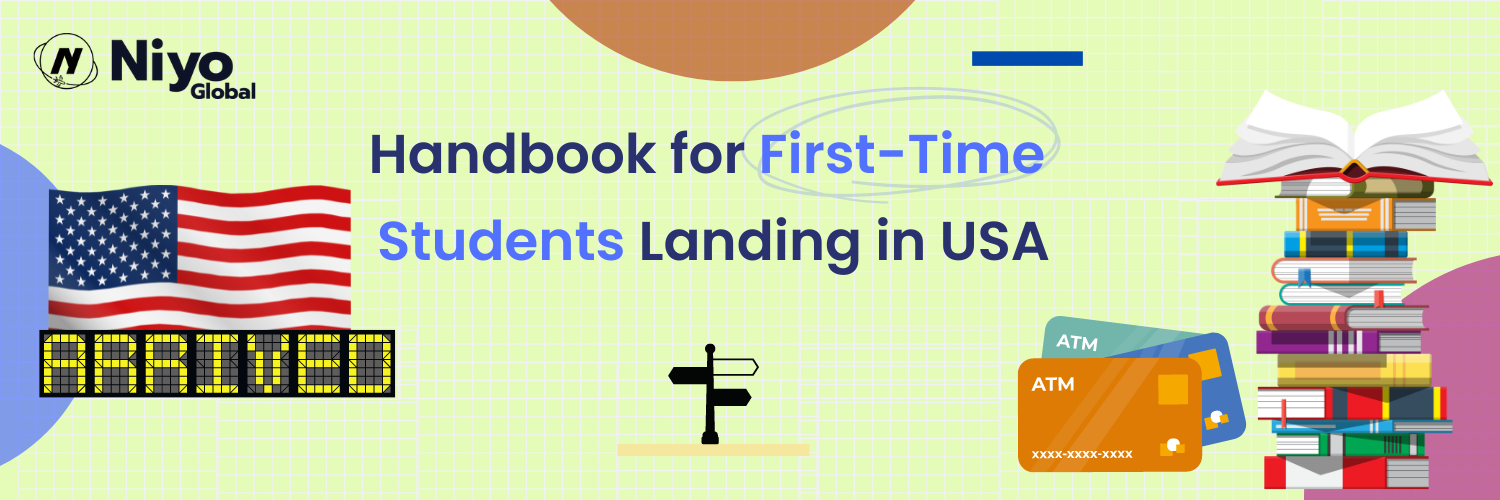
Investment Tips for International Students in USA
How To Start Investment For International Students In The USA
[playht_player width=“100%” height=“90px” voice=“Noah”]
Studying in the United States is super exciting for international students! Besides classes and exploring a new culture, money’s another important thing to consider. Investing might sound like a big, complicated word, especially in a new country, but it’s like planting seeds for your future.
This guide is here to help make investing simple for international students in the USA. We’ll start by understanding the basics, figuring out your money goals, and then taking small steps to invest wisely. Whether you’re saving for school, emergencies, or future plans, this guide will break down the steps on how you can start investing as an international student in the USA so you can confidently shape your financial journey during your time in the U.S. Let’s make the world of investing a bit less confusing and a lot more accessible!
Best Way To Invest Money For Students
Here are the five best ways to invest money for college students, from the super-safe to the bold.
1. Consider starting with a high-yield savings account or CDs
One of the smartest ways to grow your savings is by putting your money in the best high-yield savings account for students. These accounts give you more interest in your money than regular savings or checking accounts. You can take out your money whenever you need to, and right now, because interest rates are higher, you get even more from these accounts. Some people don’t see bank things like high-yield savings accounts or CDs as investments, but they are, and they’re super safe. CDs pay you a fixed interest rate when you agree to keep your money in the bank for a certain time. They’re perfect for money you don’t need until later, like if you’re saving for next year’s tuition. It’s a safe way to keep your money without worrying about the ups and downs of the stock market.
2. Turn to a free or low-cost broker
Starting to invest is now super affordable, especially with the best investment apps available. Online brokers like Fidelity Investments and Charles Schwab allow you to trade stocks and ETFs for free while providing helpful tools for learning about investing. Fidelity and Schwab are known for being excellent at assisting investors. For those who want everything to be free, especially students looking to save money, there’s Robinhood. On Robinhood, you can trade stocks, options, and even cryptocurrencies without any fees. They also offer research from Morningstar for just $5 a month with Robinhood Gold. Plus, Robinhood has a cool app that lets you trade from anywhere, making it one of the great investment apps.
For those who want everything to be free, especially students looking to save money, there’s Robinhood. On Robinhood, you can trade stocks, options, and even cryptocurrencies without any fees. They also offer research from Morningstar for just $5 a month with Robinhood Gold. Plus, Robinhood has a cool app that lets you trade from anywhere, making it one of the great investment apps.
Webull is another option for people who really want to save money and is considered one of the great investment apps. Like Robinhood, Webull lets you trade without paying any commissions. It also has more customer support options and even offers retirement accounts, which Robinhood doesn’t have. So, if you’re looking to invest without spending a lot, these options, including the best investment apps, make it pretty easy and affordable.
3. Invest a little each month
If you choose a broker that doesn’t charge fees, you can invest a small amount of money each month without worrying about losing it to fees. This means more of your money actually goes into buying stocks or funds. You can start with as little as $20 or $30 a month and see your money grow in the stock market. Some brokers even let you buy a part of a share.
It’s essential to start investment for international students no matter what’s happening in the economy. Even if it’s a small amount, you’ll likely be more interested in following the market. Plus, you can start thinking of yourself as an investor. When your money is invested, it encourages you to do research and understand your investments. So, starting with just a little money can be really helpful.
4. Buy an S&P 500 index fund
A really good investment for college students is something called an index fund. Many students like the ones based on the Standard & Poor’s 500 index, which includes big American companies. This fund holds a bit of all the stocks in the index, like hundreds from the S&P 500. Since it has lots of different stocks from different industries, it’s less risky compared to owning just one stock.
The cool thing about index funds is you don’t need to know a ton to start. Getting an S&P 500 index fund is like getting a piece of the whole market, and you get what the market gets. It’s a great way to learn about investing, and even the famous investor Warren Buffett recommends it for most people.
5. Open an IRA
Thinking about an IRA while you’re still in college might seem early, but it can actually be a smart move, especially if you have a job. An IRA helps you save for the future and can save you money on taxes. It lets you delay paying taxes on any profits or dividends, and you can deduct your contributions from your taxable income.There’s something called a Roth IRA, which is another good way to start investing for when you retire. With a Roth IRA, you use money that’s already been taxed for your contributions. So, you don’t save on taxes right away, but the good part is, when you take the money out during retirement, you don’t have to pay taxes on it. This is handy because, in college, you’re likely in a lower tax bracket, and it helps you avoid a big tax bill later. The money you put in a Roth IRA also grows without being taxed along the way. It’s like a double win!
Best Investment Apps To Start Investing
Starting to invest is super easy now. All you need is an ISIC card, and you can begin right away. You can quickly download some great investment apps to start your investment journey instantly.
Robinhood
Robinhood stands out as one of the best investment apps, offering commission-free trading for stocks, options, ETFs, and cryptocurrencies. It’s an ideal choice for small-scale investors looking to initiate their investment journey with modest amounts.
Schwab
Schwab emerges as one of the great investment apps, functioning as a full-service brokerage firm with an extensive array of investment choices, encompassing stocks, bonds, mutual funds, and ETFs. Noteworthy for its low fees and exceptional customer service, Schwab proves to be a highly attractive option for small-scale investors.
Webull
Webull is a dynamic investment app known for its commission-free trading platform, enabling users to buy and sell stocks, ETFs, and options seamlessly. With an emphasis on advanced trading tools and features, Webull appeals to investors seeking a more robust and analytical approach to their investment strategies. The app’s user-friendly interface, coupled with the availability of commission-free trades, positions Webull as an attractive option for those looking for a comprehensive and efficient investment experience.
Fidelity
Fidelity stands out as a brokerage app that not only boasts minimal fees but also provides prompt customer service, rendering it yet another exceptional choice for initiating your investments. As one of the great investment apps, Fidelity combines cost-effectiveness with responsive support to create a favorable environment for investors looking to start their journey.
Benefits of Investing Early as a Student Living in the USA
Investing early as a student living in the USA offers numerous benefits, particularly for international students. Let’s explore these advantages and explore the best ways for students to invest money.
Long-Term Wealth Growth: Early investments have the advantage of time. Students can benefit from compounding by putting money into various investment vehicles like stocks, bonds, or real estate, allowing their wealth to grow significantly over the long term.
Tailored Investment for International Students: Investing is especially crucial for international students, providing them with an avenue to navigate the financial landscape of a new country. It’s a strategic move to build financial stability while studying abroad.
Potential for Higher Returns: Compared to traditional savings, investments have the potential to yield higher returns. This can be a game-changer for students looking to accumulate funds for significant milestones like purchasing a home or funding their education.
Diversification: Investing allows students to diversify their portfolios, spreading their funds across different assets. This diversification helps manage risk and ensures that the success of others mitigates the impact of a poor-performing investment.
Financial Education: Engaging in investments is a practical way for students to gain financial education. It teaches them about market dynamics, risk assessment, and the importance of making informed financial decisions.
Best Way to Invest Money for Students: The best way for students to invest money involves considering their financial goals, risk tolerance, and time horizon. International students must explore investment options that align with their specific circumstances and offer flexibility for managing investments from a foreign country.
Preparation for Future Expenses: Early investment for international students can be a financial safety net for future expenses, such as repaying student loans or unexpected costs. This preparation contributes to financial resilience and independence.
Tax Advantages: Some investment options come with tax benefits. Students can explore tax-advantaged accounts, maximising their returns while minimising their tax liability.
Adaptability to Market Changes: Investing early helps students become more adaptable to market changes. This adaptability is a valuable skill that will serve them well as they face the ups and downs of financial markets throughout their lives.
Building Good Financial Habits: Engaging in investments early on encourages the development of good financial habits. Regularly setting aside money for investments instils discipline and fosters a mindset of strategic financial planning.
Investing early is a powerful financial strategy, especially for international students in the USA. It opens avenues for wealth accumulation and provides a hands-on education in financial management. When considering the best way for students to invest money, tailoring the approach to individual circumstances and international considerations is essential, ensuring a well-rounded and informed investment strategy.
Types of Investment Assets
Now that the basic definition of small-scale investing is out of the way let’s look at the different types of investment assets you can invest in as a part of your portfolio.
Stocks
When you invest in stocks, you buy a piece of a company. This makes you a shareholder, like a partial owner. As the company does well and makes money, the value of your shares goes up. It’s like being a part owner of a growing business.
Bonds
Bonds are like loans you give governments or companies when they need money. When you invest in bonds, you’re lending them money for a set time, and they promise to pay you back with interest at a fixed rate. It’s a bit like being a money lender for a specific period.
Mutual Funds
Think of mutual funds as a bunch of different stocks from a specific industry all grouped together. Professionals manage these funds, making them great for people who don’t have a lot of money to invest.
Certificates of Deposit (CDs)
Certificates of Deposit (CDs) are like a special savings account where you put your money for a set time, and you get a fixed amount of interest. They are considered a safe choice, making them akin to the best student savings accounts, because you’re sure about how much you’ll get back, and there’s not much risk involved. CDs can be a reliable option for students looking to save money and earn a guaranteed return, offering a stable way to grow their savings over a fixed period.
Exchange-Traded Funds (ETFs)
Think of ETFs as a mix of different things, like how mutual funds work. The cool thing is that you can buy and sell ETFs on stock exchanges, just like you do with regular stocks. They give you a way to spread your money and don’t cost a lot, making them a great choice for students who want to invest without spending too much.
The Risks And Returns Of Investing
Understanding the link between risk and return is crucial for international students diving into investments. Generally, if the risk is higher, there’s potential for greater returns, but it also means a higher chance of losing money. It’s vital for international students to figure out their risk tolerance, which is essentially how comfortable they are with taking risks.
For students investing internationally, managing risk becomes even more crucial. Diversification is a smart strategy here. This involves spreading investments across different types of investment assets like stocks, bonds, and real estate. This way, if one investment doesn’t perform well, the others might balance it out.
Keeping an eye on investment performance involves looking at both risk and return. Measures of risk include standard deviation and beta, while return can be measured through yield, capital gains, and total return.
In the world of investments for international students, it’s not just about potential gains but also about understanding and managing the risks involved.
Conclusion
Investing as an international student in the USA is a valuable opportunity for financial growth and learning essential money management skills. Diversification across different types of investment assets is crucial for risk management. Starting early brings benefits like long-term wealth growth and tailored financial strategies. Small-scale investing options, such as stocks and bonds, cater to limited budgets. Utilising high-yield savings accounts and low-cost brokers are practical way to begin. Some of the great Investment apps like Robinhood and Fidelity provide accessible platforms. However, understanding the balance between risks and returns, measured through tools like standard deviation and beta, is crucial. In essence, investing is a holistic journey toward financial literacy and independence for international students, whether through small steps or long-term goals.
Frequently Asked Questions
- Why is investing important for international students?
Investing is vital for international students as it offers a chance for financial growth, helping achieve long-term goals like home buying or education funding. It provides practical education about financial markets, cultivating essential money management skills. Beyond wealth accumulation, investing fosters financial literacy, independence, and strategic planning, crucial for navigating an educational journey in a foreign country.
- Are there specific financial goals that international students should consider when investing?
Certainly, international students should consider specific financial goals when investing. These may include building a financial safety net for unforeseen expenses, funding education expenses, saving for future career transitions, or accumulating funds for major life milestones. Additionally, international students might aim to achieve long-term objectives such as purchasing a home or building wealth for post-graduation endeavors. Tailoring investments to align with these goals helps create a strategic and personalized approach to financial planning during their time abroad.
- What are the key measures of investment risk and return that international students should understand?
International students must understand key investment measures. Standard Deviation and Beta gauge risk, with higher values signaling increased volatility. Yield, Capital Gains, and Total Return assess different aspects of returns. Mastery of these metrics empowers students to make informed investment decisions and manage risks effectively.
- What common mistakes should international students avoid when starting their investment journey?
International students starting their investment journey should avoid common mistakes: diversify to minimise risk, understand personal risk tolerance and financial goals, resist emotional decisions during market fluctuations, prioritise research, and avoid reliance on speculative investments without adequate understanding. A thoughtful and informed approach is key for success.
- What Is Small-Scale Investing?
Small-scale investing involves making modest financial investments with limited capital, catering to individuals with smaller budgets. Accessible through online platforms with low transaction costs, this approach allows for diversification across various assets like stocks and bonds. Goal-oriented and often adopting a long-term perspective, small-scale investors can use this strategy to achieve specific financial objectives, such as saving for a home or funding education. The flexibility of small-scale investing accommodates adjustments based on changing financial circumstances, making it an accessible and empowering option for individuals looking to participate in the financial markets and build wealth over time.







